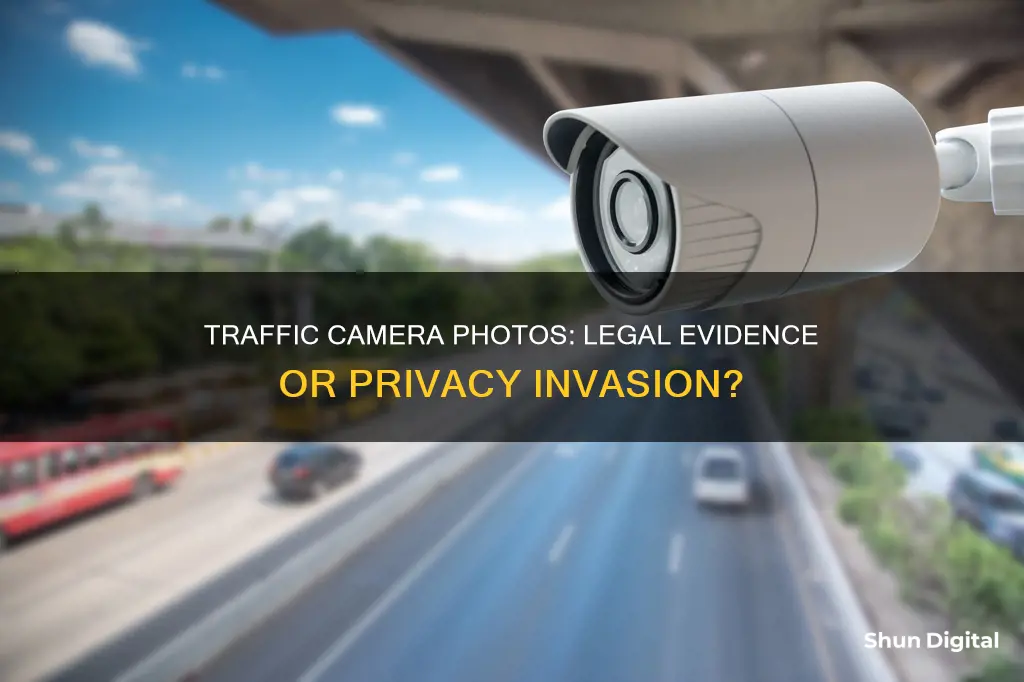
The use of traffic cameras in Tennessee has been a controversial topic for over a decade, with opponents arguing that they are more about generating revenue than improving safety. In 2020, a state lawmaker announced plans to introduce an outright ban on red-light cameras during the legislative session. This came after Texas banned red-light cameras and joined at least seven other states that had already done so. Tennessee law currently classifies traffic camera citations as non-moving violations, meaning they do not count against driver's license points, and prohibits camera companies and cities from notifying credit agencies about unpaid fines. However, companies can still assess fees and court costs for unpaid tickets. The debate around the legality and effectiveness of traffic cameras in Tennessee continues, with no clear resolution in sight.
What You'll Learn
- Traffic camera pics are civil citations, not criminal
- Municipalities must conduct a traffic engineering study before installing a new unmanned traffic camera
- Traffic camera fines are limited to $50 each in Tennessee
- Evidence from unmanned traffic cameras must meet certain requirements to be used for ticketing
- Some vehicles are exempt from receiving traffic camera violation notices

Traffic camera pics are civil citations, not criminal
State Representative Andy Holt has been an outspoken opponent of traffic enforcement cameras and has encouraged people not to pay their camera violation fines. He has introduced legislation to make it more difficult for cities to hand out photo enforcement tickets and even burned a paper citation on video as a form of protest.
While the 16 Tennessee cities with red-light cameras may attempt to collect payment through letters, threats, collection notices, and attorney letters, these are considered intimidation tactics. In practice, it is rare for a city or company to send unpaid fines to a debt collection agency or take a violator to civil court over a $50 fine.
It is important to note that there are some exceptions to the rules regarding traffic camera enforcement in Tennessee. For example, unmanned traffic enforcement cameras used to monitor speed and issue speeding citations are prohibited except within designated school zones and S-curves of public highways or roads. Additionally, emergency vehicles, vehicles moving to clear the way for an emergency vehicle, vehicles under police escort, and vehicles in a funeral procession are exempt from receiving notices of violation based on unmanned traffic camera evidence.
The use of traffic enforcement cameras has been a controversial topic in Tennessee and across the nation. Opponents argue that these cameras are more about generating revenue for private contractors and local governments than about safety, while supporters claim that they reduce dangerous crashes and provide additional funding for government projects.
Choosing the Right Dash Camera: A Guide for Your Car
You may want to see also

Municipalities must conduct a traffic engineering study before installing a new unmanned traffic camera
In 2011, the Tennessee General Assembly passed Public Chapter No. 425 (HB1500/SB1684), T.C.A. § 55-8-198, which made significant changes to the existing traffic enforcement camera landscape. One of the most notable changes was the requirement that municipalities must conduct a traffic engineering study before installing a new unmanned traffic enforcement camera. This study must adhere to the standard engineering practices of the Institute of Transportation Engineers (ITE) and must be certified by a licensed engineer who specializes in traffic engineering.
The legislation explicitly prohibits a traffic camera vendor from conducting the study or participating in the selection of the engineer. This ensures that the study is conducted independently and impartially. Furthermore, any contract with a vendor must include a clause stating that the contract is subject to changes in state law, including all new and existing contracts, as well as contract renewals after July 1, 2012. The Attorney General has affirmed the constitutionality of this requirement, stating that it does not impair existing contracts.
The traffic engineering study is an essential step in the process of installing new unmanned traffic cameras, as it helps to ensure that the cameras are placed in locations that are necessary and effective for traffic enforcement. By requiring the study to be certified by a licensed engineer, the legislation adds a layer of credibility and accountability to the process. This helps to address concerns about the use of traffic cameras and ensures that their implementation is based on sound engineering principles and best practices.
In addition to the traffic engineering study requirement, Public Chapter No. 425 also includes provisions that make it more difficult for municipalities to ticket vehicles turning right or left onto a one-way street at red lights using solely unmanned camera evidence. The evidence must clearly show the vehicle's position before and after the stop line while the signal is red. Furthermore, to ticket a vehicle for making an unlawful right turn at a red light, a clearly marked "No Turn on Red" sign must be in place.
Regarding speed cameras, the legislation prohibits their use except within designated areas, such as marked school zones and S-curves on public highways or roads. These provisions aim to balance the need for traffic enforcement with concerns about privacy and the potential for over-ticketing. By requiring municipalities to conduct thorough traffic engineering studies and adhere to specific ticketing requirements, Public Chapter No. 425 helps to ensure that unmanned traffic cameras are used appropriately and effectively in Tennessee.
Lane Watch Cameras: Which Cars Have This Feature?
You may want to see also

Traffic camera fines are limited to $50 each in Tennessee
In Tennessee, traffic camera fines are limited to $50 each. This limit is part of the state's legislation regarding unmanned traffic enforcement cameras, which also includes several other requirements and restrictions.
For example, a municipality must conduct a traffic engineering study before installing a new unmanned traffic camera. This study must be completed in accordance with the standard engineering practices of the Institute of Transportation Engineers (ITE) and certified by a licensed engineer specialising in traffic engineering. A traffic camera vendor is prohibited from conducting the study or participating in the selection of the engineer.
The legislation also outlines the procedures for noticing and fining alleged violators. A POST-certified officer must review the evidence, and if a violation is determined, a notice of such must be sent to the alleged violator within 20 days of the violation occurring. This notice must state the amount of the fine (up to $50) and any additional fees or costs that may result from non-payment or from being found guilty after contesting the violation. Violators have 30 days from the mailing date to pay the citation, and additional fines and costs can be assessed after this period.
It's worth noting that there has been some controversy surrounding the use of red-light and speeding cameras in Tennessee. While some supporters argue that cameras reduce certain types of crashes and provide revenue for local governments, opponents criticise the cameras as being more about generating money than about safety, and claim that they increase rear-end collisions.
Mastering Bokeh: Understanding Camera's Bokeh Mode
You may want to see also

Evidence from unmanned traffic cameras must meet certain requirements to be used for ticketing
In Tennessee, the use of unmanned traffic cameras to monitor and enforce traffic laws is permitted. However, there are specific requirements that must be met for the evidence from these cameras to be used for ticketing.
Firstly, the installation of unmanned traffic cameras must be preceded by a traffic engineering study, conducted by a licensed engineer specialising in traffic engineering. This study must adhere to the standard engineering practices of the Institute of Transportation Engineers (ITE).
Regarding red-light violations, the evidence from unmanned cameras must clearly show the vehicle with its front tire before the stop line while the signal is red, and subsequently, the rear tire past the stop line during the red signal. For unlawful right turns at a red light, a clearly marked "No Turn on Red" sign must be visible in the camera evidence.
Unmanned traffic cameras for speed monitoring and issuing speeding citations are prohibited in Tennessee, except within designated school zones and S-curves of public roads or highways.
It is worth noting that the use of traffic cameras for enforcement is a controversial topic, raising questions about public safety, privacy, and drivers' rights. While some states embrace this technology, others have implemented bans or limitations on their use.
In Tennessee, while the use of unmanned traffic camera evidence for ticketing is legal, it is still a civil citation rather than a criminal one. This means that non-payment of the fine does not adversely affect one's credit report, credit score, driver's license points, or automobile insurance rates.
Camera Battery Drain: Which Device Kills It Faster?
You may want to see also

Some vehicles are exempt from receiving traffic camera violation notices
In Tennessee, some vehicles are exempt from receiving traffic camera violation notices. This is because the state only permits the use of unmanned traffic enforcement cameras in designated school zones and on S-curves of public highways or roads.
In 2011, the Tennessee General Assembly passed Public Chapter No. 425 (HB1500/SB1684), T.C.A. § 55-8-198, which made significant changes to the traffic enforcement camera landscape. One of the most notable changes was the requirement for municipalities to conduct a traffic engineering study before installing new unmanned traffic enforcement cameras. This study must be completed by a licensed engineer specialising in traffic engineering and in accordance with the standard engineering practices of the Institute of Transportation Engineers (ITE).
The legislation also sets out specific requirements for ticketing vehicles turning right or left at red lights using only unmanned camera evidence. For a vehicle to be ticketed for failure to come to a complete stop before turning at a red light, the evidence must clearly show the vehicle with a front tire before the stop line when the signal is red and subsequently show the same vehicle with a rear tire past the stop line while the signal is red. To ticket a vehicle for making an unlawful right turn at a red light, there must be a clearly marked "No Turn on Red" sign in place.
It's important to note that these provisions refer specifically to "unmanned" cameras, and an officer's passive presence near a traffic enforcement camera does not remove it from this category. However, if an officer actively operates a camera, such as one mounted in a patrol car, it would not be subject to the same restrictions.
When it comes to enforcing these traffic camera violation notices, West Tennessee State Representative Andy Holt (R-76th District) has stated that individuals do not have to pay these civil citations. According to Holt, the 16 Tennessee cities with red-light cameras may attempt to collect payment through letters, collection notices, and even threats of legal action. However, he believes that for a $50 fine, it is not worth the time or energy for the companies to take individuals to civil court.
Frank's Focus: The Camera's Perspective in House Party
You may want to see also
Frequently asked questions
Traffic camera tickets are legal in Tennessee, but they are considered civil penalties, not criminal offenses.
According to state lawmakers, you do not have to pay a traffic camera fine, as it is a civil citation and not a criminal one. However, the city that issued the ticket may still try to collect payment.
If you don't pay a traffic camera ticket, the city or the camera vendor could send your unpaid fines to a debt collection agency or take you to civil court. In practice, these actions are rare, as the costs associated with them would outweigh the $50 fine.
No, by law, traffic camera citations are classified as non-moving violations and cannot count against your driver's license points. Camera companies and cities are also prohibited from notifying credit agencies about unpaid fines.
In Tennessee, a municipality must conduct a traffic engineering study prior to installing a new unmanned traffic enforcement camera. This study must be completed by a licensed engineer specializing in traffic engineering and in accordance with the standard engineering practices of the Institute of Transportation Engineers (ITE).







